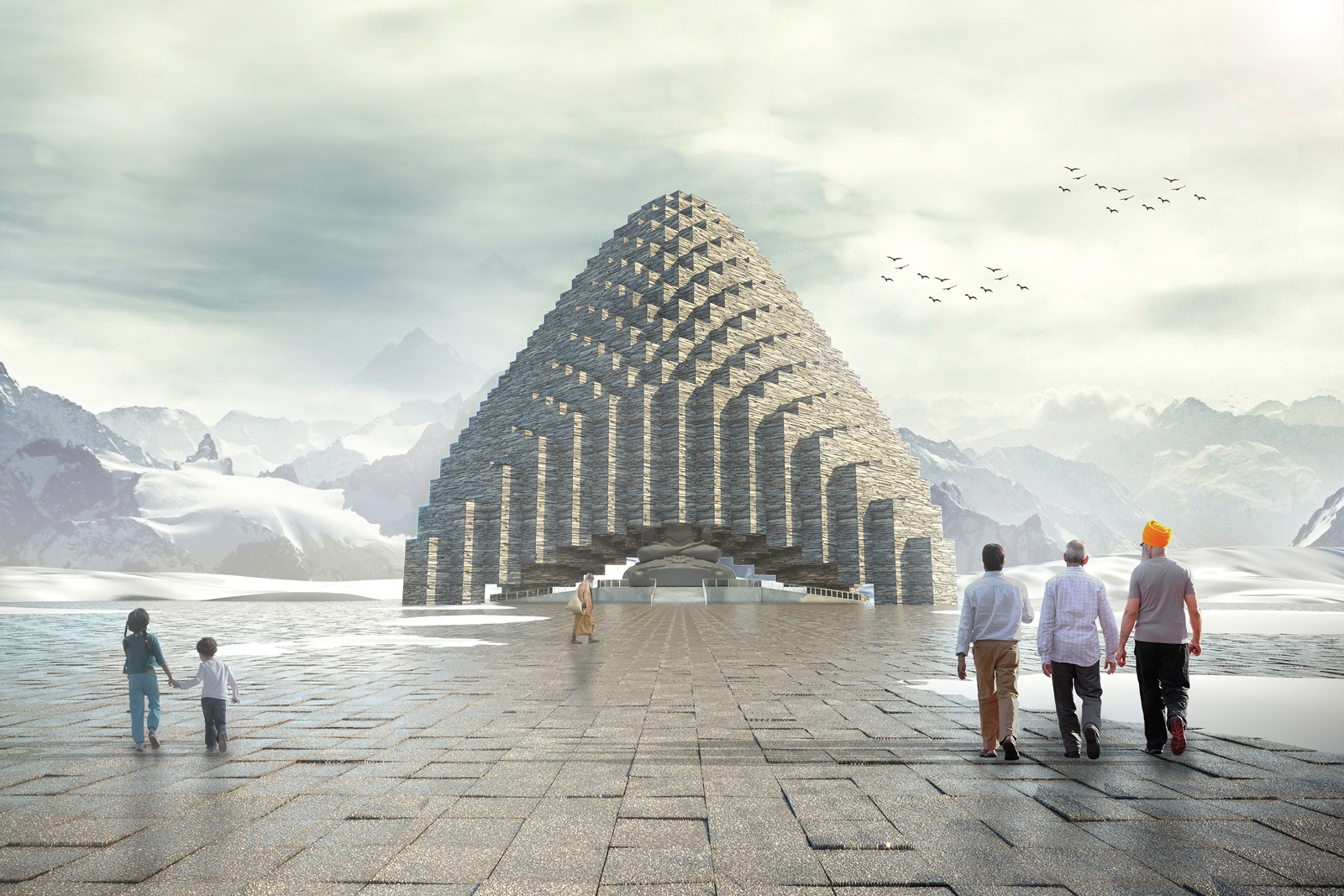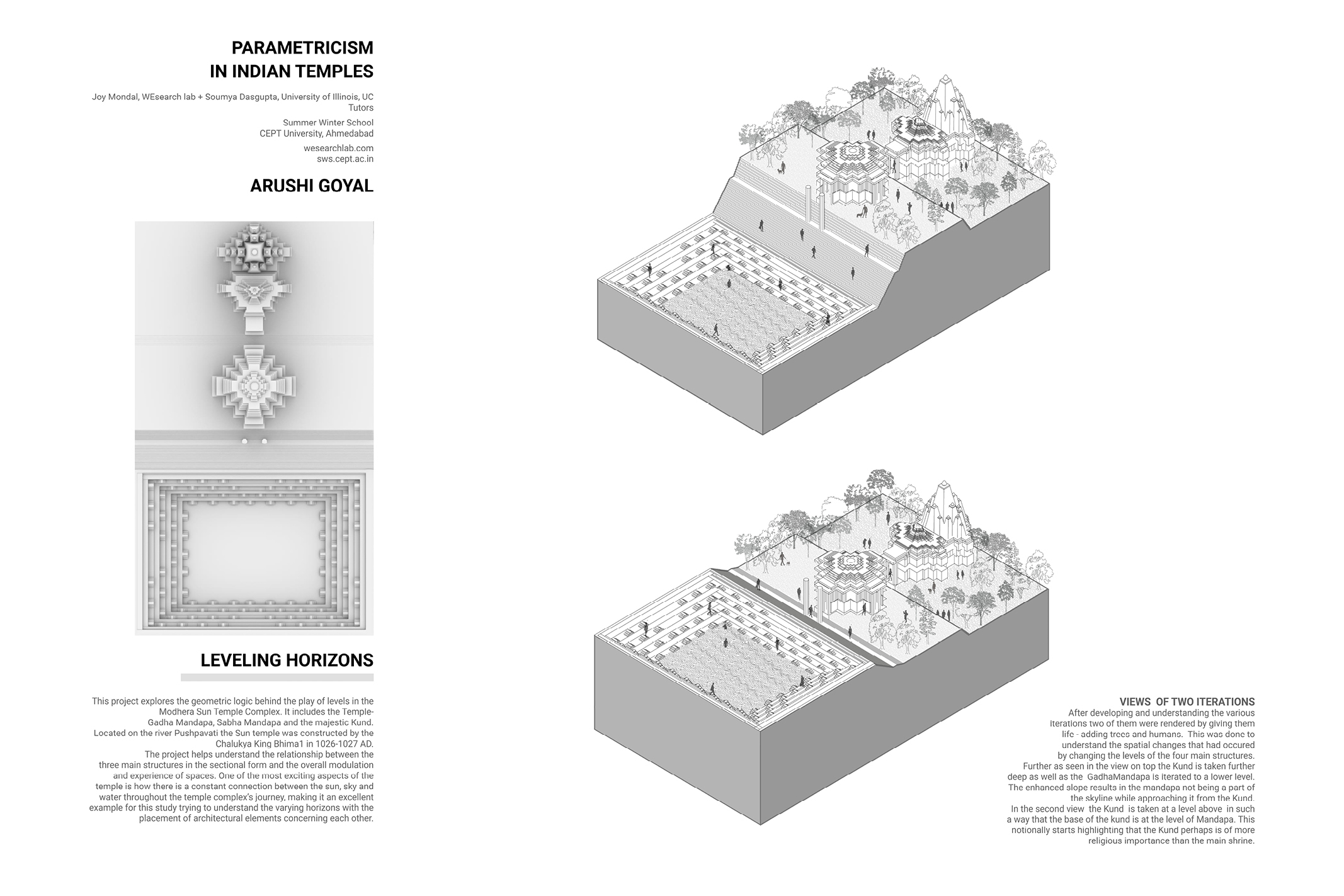WEsearch lab invites you to participate in a 4-day long online workshop on Parametricism in Indian Temples. The workshop will understand the past through the tools of the future. The workshop will introduce cutting edge concepts of Parametric Design to understand the underlying geometrical logic in the architectural forms of Indian Temples. Participants will be learning parametric modelling techniques, understand the geometric aspects of Indian temples, and then explore such geometries through exercises.
If you want to understand the geometrical logic in Indian Temples through hands-on parametric exercises.
If you want an introduction to the use of parametric tools in a manner that can be applied to conventional/historical architecture.
Geometries of Indian Temples provide a rich and underexplored terrain of complex algorithms. Traditionally taught in the pedagogy of architectural history, the inter- and intra-variances in the geometric systems make Indian Temples an ideal subject for understanding the concepts of associative parameters (through the relationship of form and detailing), and iteration (by generating exhaustive lists of macro-level forms). Using Rhino and Grasshopper to understand, explore, and imagine Indian Temples provides an innovative method to learn tools of the future with examples of traditional design.
The technique of Parametric Design opens new ways of interpreting geometries. It marks a paradigm shift where relationships between elements are used to manipulate and inform the design of geometries and structures. The focus shifts from the process of modelling geometry, to the process of defining geometry.
The workshop shall cover 5 major topics -
- Rhino modelling,
- Grasshopper scripting,
- Introduction to Indian Temple typologies,
- Logic of parametric association and fractal in Indian Temples, and
- Scripting exercises to explore plans, superstructures, spires and arches.
Day 1 (15 May | Sat ) Focus - Understanding geometric logic + Rhino
Parametric logic in Temples - Associative and Fractal types
Rhino complex modelling of surfaces
Logic of Arch and Spire
Day 2 (16 May | Sun) Focus - Understanding Grasshopper scripting
Introduction to Grasshopper scripting
Associative representation: script of morphing Arch
Associative representation: script of parametric Spire
Mon to Fri Buffer time: Temple typologies video watch + self practice
Day 3 (22 May | Sat) Focus - Complex Temple logic building
Parametric logic in plans derived from Rathas: tri, pancha, sapta, etc.
2D Fractal: Parametric Mandapa plan variation through parametric script
Day 4 (23 May | Sun) Focus - Complex Temple logic building
3D Fractal: Temple exterior volume variation through parametric script
Generating Iterations through Grasshopper
Iteration Documentation for Presentation
The content of this course has been developed with Soumya Dasgupta. Soumya is a Doctoral Candidate in Architecture (History and Theory) at the University of Illinois at Urbana-Champaign, USA. He has a Masters in Urban Design from School of Planning and Architecture, New Delhi and a Bachelor of Architecture from Indian Institute of Engineering Science and Technology, Shibpur, Kolkata, India. Learn more about him here.
15, 16, 22, 23 May (Sat, Sun, Sat, Sun)
6 pm to 10 pm each day
The workshop is scheduled across 4 days (4 hours each) – on Saturday and Sunday of two successive weekends. Such a schedule will facilitate ease of participation and allow participants to practise for 5 days between the two weekends. The workshop is scheduled in the evening to avoid clashes with college or office timings. Participants will get a first-hand taste of the design workflow of top ranked universities and practices from around the world. Custom scripts that are made in-house will be shared.
The workshop will be tutored by Joy Mondal. He leads WEsearch lab which offers design computation consultancy to architecture practices in South-east Asia. He has released Grasshopper plugins to automate column-beam placement (Eelish) and to generate Piet Mondrian inspired 2D composition and 3D massing (Chingree). Joy is a TEDx fellow, presenting ways of democratising architecture for everyone by using graph theory and shape grammar to automate residential design generation, thereby making design service more affordable. He was the recipient of the inaugural Saint-Gobain research scholarship. His research has been published in various international CAAD conference proceedings including at ICETAD, SIGRADI and ASCAAD. He has taught subjects related to parametric design and AI in architecture at SPA, Delhi and CEPT University, Ahmedabad; and tutored at multiple international workshops including at Digital FUTURES, The American University in Cairo, The Chinese University of Hong Kong and University of Southern California.
Participants are expected to gain the following -
- Understand and apply the principles of computation and parametric design in architecture,
- Explore parametric representation, test the use of parameters and their inter-relationships to generate simple and complex forms,
- Be able to define and iterate geometric systems,
- Understand the geometric logic and elements of Indian temples,
- Get a working knowledge of Rhino and Grasshopper, and
- Be able to apply the learnings in academic and/or professional projects.
The logic (top row) and the variations (right half) in the following images were developed by participants at our workshop at CEPT University. During the workshop, they learned - (1) Algorithmic thinking to extract geometrical logic from reference images, (2) The technical skill of converting the logic into a Grasshopper script, and (3) Use the script to generate variations. These images are indicative of the skillset that you will acquire after participating at this workshop.
The workshop is open to students of all years.
The workshop is open to all professionals.
No prior knowledge of Rhino or Grasshopper is needed.
Rhino 7 (90-day evaluation, Grasshopper included) can be downloaded for free here.
The details of the online platform to attend the workshop shall be shared on completion of registration.
For any queries, email to info@wesearchlab.com with the subject Query- Parametricism in Indian Temples.
Previous partner + collaborator + host








